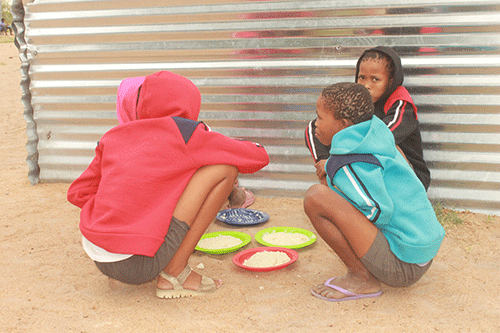NKURENKURU – The Kavango West leadership says the marginalised community’s food programme is not achieving its intended purpose, a situation that has left many starving.
The programme is run by the Ministry of Gender Equality, Poverty Eradication and Social Welfare.
“Our appeal is for this programme to be run through the regional council, just like the drought relief, so that the chief regional officer can be in control,” appealed governor Sirkka Ausiku during a meeting with Deputy Prime Minister John Mutorwa recently.
The Kavango West regional council said they have attempted to assist with the programme, but those responsible have not come to the party. According to the governor, sometimes when the food is available, it stays in the warehouse for extended periods while intended beneficiaries, particularly the San community, starve.
“Unfortunately, if you happen to hear that the San have died, we will go viral in the media. We have been calling (sic), and last time when the executive director came, we raised the concern that the Ministry of Gender Equality, Poverty Eradication and Social Welfare under which the programme falls, is unable to run this. So, they must let it go under the same management as drought relief. Even the staff member who has been seconded to this programme switches her phone off when the community is calling,” said Kavango West regional council chairperson, Joseph Sivaku Sikongo.
He said about two weeks ago when he visited the community of Mangetti and the San community, they were “crying that they were not getting their food.” “I even have the message from their village development committee, saying these people are dying. If the government continues with the decision that the ministry of gender equality runs it, then that might mean we are not serious with people. Let this programme be administered in the same way as the drought relief. We will then own it, and make sure they get their food because now they are pointing fingers at councillors,’’ he said.
“They are the minority, and if we allow their voices not to be heard, this is not a successful programme,” he noted.
Kavango West acting CRO Mathew Singambwe said at the regional level, they have tried to assist where they can, but the responsible office is not active.
“We have tried our best; the council even assigned a driver to assist when there’s food to be delivered because the designated staff member from the responsible ministry can’t even drive. That is how critical this situation is; we have hired a driver for Nkurenkuru constituency to distribute the food,’’ he said.
Singambwe added that when they have food in stock, their warehouse is fully-packed, and food stays longer and gets rotten. “I got involved, and called the deputy director of programmes at the ministry because amongst all the programmes their ministry is having, there are only two that are not delegated to the regional council. These are the marginalised programme and the burial/coffin programme of the marginalised community. These two programmes are giving the region problems,’’ he stated.
“At the regional level, we have tried to intervene, but the fact that they are not in our scope makes it a challenge,” he said.
The regional council asked Mutorwa to investigate their struggles in earnest.
“Maybe at Cabinet level, if it can be discussed that it is delegated as well, or appoint a dedicated staff member because this staff member in the region is not employed for this particular programme. In most cases when she gets pressure, she responds to us saying ‘You are giving me pressure, I’m not being paid for this, I am just assisting.’ Then we can also now not push her any further,’’ Singambwe said.
The director of disaster risk management in the Office of the Prime Minister, Helen Likando, who accompanied Mutorwa, said there was a request from the responsible ministry that their budget was depleted, and they did not have money to buy food monthly.
Consequently, “this submission was considered, and at OPM drought relief, we were directed that we should include the marginalised community figures into the drought relief food programme. This is so they get food on a monthly basis until their budget is approved. This is what we have done.”
Likando said their budget has now been approved and increased.
They are now busy with the procurement of food, and should be able to feed the marginalised communities monthly. She said the amount of money their ministry was given is sufficient, going forward.
Questions sent to the ministry’s spokesperson, Lukas Haufiku, were not responded to at the time of going to press yesterday. -jmuyamba@nepc.com.na


